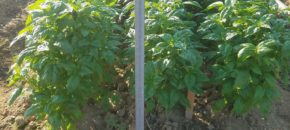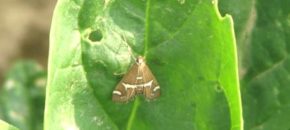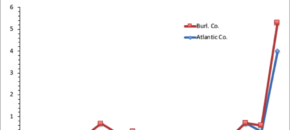Note: This is the final weekly edition of the Vegetable IPM Update for 2018. Further updates may be published in response to specific pest threats. Sweet Corn European corn borer (ECB) moth catches remain low. There will be no map in this edition.
Continue reading...An Introduction To Rutgers Downy Mildew Resistant Sweet Basils

After nearly a decade’s worth of research and breeding efforts Rutgers Downy Mildew Resistant (DMR) sweet basils are now available to commercial growers with seed for homeowners and gardeners becoming available in 2019. Since 2007, when basil downy mildew (BDM) was first identified in FL, the disease has caused significant economic losses to commercial basil growers throughout the […]
Continue reading...Vegetable Disease Update – 10/01/18
Anthracnose fruit rot has been found on pumpkin. Bacterial stalk rot in sweet corn has been reported. Downy mildew has been reported in bok choy. Cole crops, as well as leafy greens, need to be scouted on a regular basis and preventative sprays applied as long as wet weather continues. Pepper anthracnose has been reported. If […]
Continue reading...IPM Update 09/26/2018

There will be no maps for this edition of the IPM Update. Sweet Corn State-wide, European corn borer and fall armyworm have declined in the traps. There has been little field activity for either moth. Corn earworm Corn earworm populations have declined, but based upon blacklight information, most areas of the state will need to […]
Continue reading...Webinar on Best Practices for Pesticide Aerial Application

Register for September 27 Webinar on Best Practices for Pesticide Aerial Application EPA is hosting a webinar titled “Best Practices for Aerial Application” on September 27, 2018, from 2 – 3:30 pm ET. This webinar is tailored for growers, pesticide applicators, pest management professionals, and other interested stakeholders who work in crop […]
Continue reading...Fruit IPM for 9/19/18

Apples: Brown Marmorated Stink Bug (BMSB): BMSB presence is spotty and still much higher than it was earlier in the summer. Now that apples (and pears) are the only fruit present for BMSB to feed on, growers must have a program to address this pressure.
Continue reading...